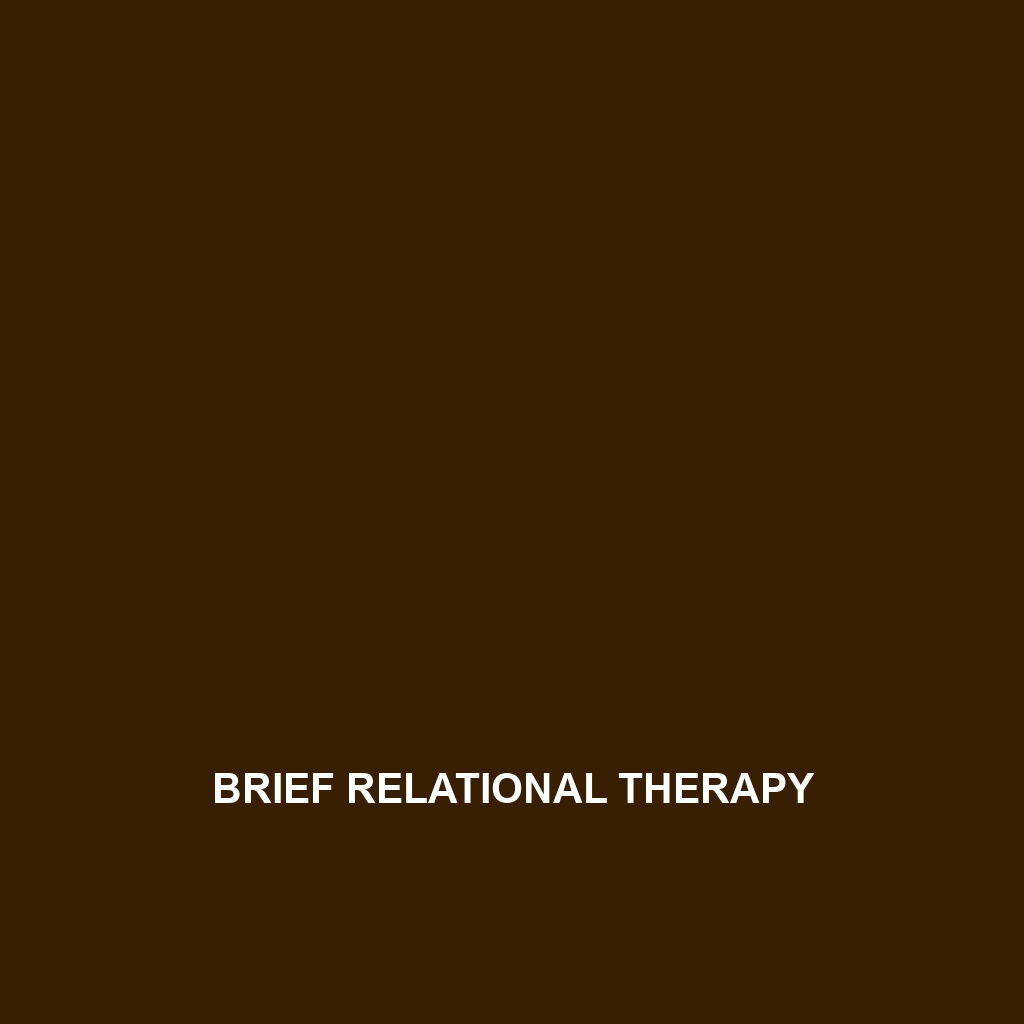Brief Relational Therapy: An Innovative Approach to Mental Health Support
Overview
Brief Relational Therapy (BRT) is a specialized mental health service designed to facilitate quick and effective psychological support through an emphasis on relational dynamics. Rooted in the principles of relational therapy, BRT aims to address both the symptoms of mental health challenges and the interpersonal relationships that can either aid or obstruct an individual’s emotional well-being. By focusing on the connections between clients and significant others, BRT helps individuals to cultivate meaningful relationships, enhance emotional awareness, and work through conflicts in a constructive manner.
The core purpose of Brief Relational Therapy is to provide clients with the tools and insights necessary to navigate their emotional challenges effectively while fostering healthier relationships. Through this integrative approach, BRT aims to achieve substantial improvements in mental health and relationship dynamics in a relatively brief period, making it an ideal option for modern needs in mental health care.
How It Works
Brief Relational Therapy operates on several key methodologies and practices that make it both unique and effective:
- Focus on Relationships: At its foundation, BRT acknowledges the importance of relationships in shaping our mental health. Therapists explore clients’ relational histories and current interactions, giving attention to how these relationships influence emotional states.
- Time-Limited Sessions: Rather than engaging in prolonged therapy, BRT is structured around a limited number of sessions, typically ranging from 8 to 12. This timeframe encourages clients to quickly identify challenges and implement strategies for change.
- Client-Centered Approach: BRT is deeply rooted in understanding the client’s perspective and experiences. Therapeutic dialogue is guided by the client’s needs, ensuring relevance and applicability of the therapy provided.
- Skill Development: Clients are equipped with coping strategies and relational skills that empower them to manage their emotional health long after therapy concludes. This proactive stance supports sustained improvement.
- Feedback Loops: Continuous feedback between the therapist and client enables a dynamic therapeutic process, where adjustments can be made in real-time to enhance the effectiveness of the treatment.
Benefits
Engaging in Brief Relational Therapy offers numerous advantages for individuals seeking mental health support:
- Quick access to effective therapy with a clear focus on relational dynamics.
- Enhanced understanding of emotional responses in relation to interpersonal conflicts.
- Development of practical tools to improve communication skills within relationships.
- Empowerment to establish healthier boundaries and promote awareness of relational patterns.
- Increased resilience and coping mechanisms for managing stress and emotional challenges.
- Time-efficient treatment that respects clients’ busy lifestyles while still offering profound insights and growth.
- A supportive environment that encourages vulnerability and open discussions concerning relationships.
Who It’s For
Brief Relational Therapy is suitable for a wide range of individuals and groups, specifically:
- Individuals Facing Relationship Difficulties: Those experiencing conflicts with family, friends, or partners that directly affect their mental health can benefit significantly from BRT.
- Adults Struggling with Anxiety or Depression: Individuals whose emotional struggles are tied to interpersonal issues often find BRT particularly useful.
- Caregivers and Parents: Individuals responsible for others, such as caregivers and parents, can learn to manage their roles effectively while nurturing their own mental health.
- Young Adults and Students: Individuals undergoing transitional phases in life, such as entering higher education or the workforce, may use BRT to foster their self-identity and relationships during challenging adjustments.
- Couples Seeking Support: Partners aiming to strengthen their bond, resolve conflicts, or improve communication may find Brief Relational Therapy a valuable resource.
Special Features
What sets Brief Relational Therapy apart from other mental health services includes:
- Relational Mapping Technique: BRT utilizes relational mapping to help clients visualize and understand their relationships. This tool allows individuals to see how various connections impact their mental health and behavior.
- Integrative Techniques: By blending cognitive-behavioral techniques with relational modalities, BRT provides a comprehensive approach to tackle emotional services while refining interpersonal skills.
- Accessible Formats: Brief Relational Therapy can be delivered in various formats, including face-to-face, virtual sessions, and group therapy, making it flexible for different clients’ needs.
- Focus on Immediate Results: Unlike traditional therapy, which can take months or years for significant progress, BRT emphasizes quick, actionable changes that yield visible improvements often within several sessions.
Why Choose This Service
As mental health awareness continues to grow, the demand for efficient and effective therapeutic approaches becomes increasingly important. Brief Relational Therapy stands out as a compelling option for individuals looking to address mental health challenges within the framework of their interpersonal relationships. By emphasizing relational dynamics and providing time-sensitive support, BRT helps clients not only overcome their immediate psychological hurdles but also develop the skills necessary for building stronger, healthier relationships in the future.
For anyone seeking a supportive, insightful, and expedient mental health service, Brief Relational Therapy presents a valuable choice. If you or someone you know is ready to take the next step towards improved emotional well-being and relationship satisfaction, consider exploring the possibilities that BRT offers.
